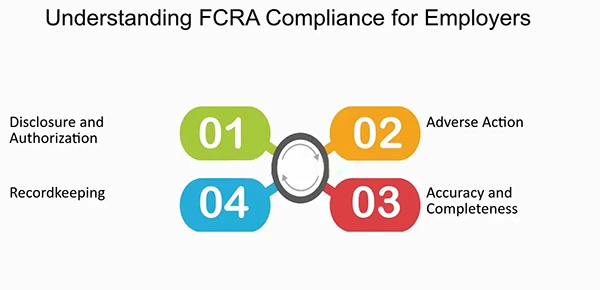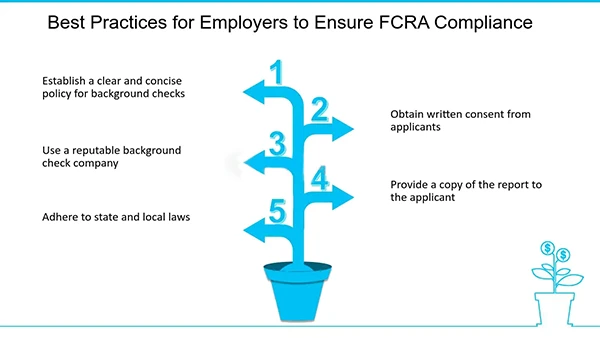Top Strategies for Ensuring FCRA Compliance in Background Checks
Employers’ background checks are not only a key aspect of protecting the business from potential risks but they also provide an opportunity to project the candidate through Fair Credit Reporting Act adherence.
In today’s job market, the integrity and legality of examining the employer’s past are paramount. And from the Screening to the interviewing stage navigating the complexities of the FCRA is a vital aspect of the hiring process.
The FCRA by the way is a federal law that regulates the collection, dissemination, and consumer information to ensure accuracy, fairness, and privacy in the use of consumer data.
So, in this read, I’m going to walk you through what is fcra compliance and how it ensures that your company respects the candidate’s rights while safeguarding them against potential legal repercussions.
Let’s start!
What is FCRA & Why is it Important?
The FCRA sets the standard for handling and using consumer information in the United States. Its importance can’t be overstated—it’s about more than just lawful compliance. Adhering to the Fair Credit Reporting Act builds trust with your candidates, demonstrating your business’s commitment to privacy and fairness.
This law ensures that the information used in background checks is accurate, secure, and used ethically, which is vital in making informed recruiting decisions.

Requirement for FCRA Compliance Background Checks
Navigating the terrain of adherence requires a keen eye for detail and a steadfast commitment to ethical practices.
This journey is not just about ticking boxes; it’s about fostering a culture of respect and trust between employers and potential employees.
Scroll down to dive deeper into the necessary steps for ensuring your background checks meet the mark.
Secure Approval from the Applicant
Obtaining explicit written consent from the applicant is the cornerstone of a compliant checking process. This step goes beyond merely fulfilling a legal obligation—it’s about initiating a relationship with potential employees on a foundation of transparency and respect.
When candidates understand and agree to the background check procedure, it not only sets a positive tone for the employer-employee relationship but also reinforces your company’s commitment to ethical practices.
This initial gesture of asking for permission reflects a respect for personal boundaries and privacy, which is invaluable in today’s workforce.
Comply with Adverse Action Procedures
Discovering potentially disqualifying information in a background check doesn’t automatically close the door on an applicant. The FCRA outlines specific adverse action steps to ensure fairness in these situations.
These procedures are designed not just for lawful submission but to offer candidates a genuine opportunity to clarify or correct discrepancies.
This approach underscores the importance of fairness and equity, ensuring every candidate is given a fair shot at the position.
By meticulously following these steps, employers demonstrate their commitment to a just and transparent selection process, reinforcing the integrity of their hiring practices.
Follow Guidelines for Retaining and Disposing of Sensitive Information
The proper management of personal information is a necessary aspect of FCRA compliance. Employers are responsible for implementing secure practices for the retention and disposal of sensitive data.
This responsibility is paramount in today’s digital age, where information breaches can severely compromise individual privacy and security.
By adopting robust data protection measures, companies not only comply with legal requirements but also show a deep respect for the privacy of their candidates.
This practice reassures applicants that their personal information is safe, enhancing the company’s reputation as a trustworthy and secure employer.
The Expenses of Non-Compliance with FCRA
Ignoring the guidelines can lead to severe financial and reputational damage. Beyond the immediate legal costs, non-submission can erode trust in your brand, making it harder to attract top talent.
The message is clear: understanding and implementing the regulations is a lawful duty and a strategic business decision.
3 Common Pitfalls and Challenges in FCRA Compliance
Despite the best intentions, companies often stumble in a few key areas of FCRA subordination.
Insufficient Disclosure and Consent/Authorization Practices
A frequent oversight is the failure to properly disclose the background check’s intent or secure the necessary authorization. This mistake can lead to significant legal trouble and damage your company’s reputation.
It’s a reminder of the integral importance of transparency in the hiring process.
Neglecting Adverse Action Procedures
Overlooking the required steps for adverse action breaches FCRA requirements and denies candidates a fair opportunity to contest or correct their information. Ensuring these procedures are followed to the letter is necessary for a fair and transparent procedure.
Inaccuracy or Incompleteness in Background Check Reports
Decisions based on faulty information can unjustly affect candidates’ employment opportunities and expose companies to legal challenges. Diligence in verifying reports’ accuracy and completeness is paramount to maintaining fairness and compliance.
4 Optimal Strategies for Ensuring FCRA Compliance in Background Checks

Navigating the requirements of the Fair Credit Reporting Act to ensure adherence to examining the employer’s past is not just about ticking boxes; it’s about embedding fairness, accuracy, and respect into the fabric of your recruiting procedure.
Scroll down further to learn how to achieve and maintain this compliance through four strategic actions.
Crafting a Comprehensive Policy for Background Checks
A solid foundation is key to any successful strategy, and in FCRA subordination, this starts with crafting a comprehensive policy.
This document should be more than just a set of rules; it should articulate your company’s commitment to ethical practices, outlining clear, actionable steps for every phase of the background check process.
This policy becomes the north star for your hiring teams, ensuring every action is aligned with FCRA guidelines and reflects your organization’s values.
It’s about creating a culture of transparency and integrity, where both the candidates’ rights and the corporation’s needs are held in balance.
Choosing a Trustworthy Consumer Reporting Agency
Choosing a consumer reporting agency (CRA) is a pivotal decision. A trustworthy CRA is not just a vendor; they are your partner in ensuring the integrity and obedience of your background checks.
Look for agencies with a proven track record of FCRA compliance who prioritize accuracy and legal adherence in their reporting.
This partnership should be built on open communication, with the CRA willing to work closely with your team to tailor their services to your needs and challenges.
Verifying the Accuracy and Completeness of Background Check Reports
Inaccurate or incomplete reports can lead to unfair recruiting decisions, lawful challenges, and damage to your business’s reputation. Regular audits and verifications of the background check procedure are essential.
This means checking for accuracy and ensuring that the information is complete and up to date. Such diligence demonstrates your commitment to fairness and due diligence, showing candidates and employees that you value integrity in your hiring process.
Protecting Applicant Information and Upholding Data Privacy
Data privacy is a necessary concern for candidates and companies in today’s digital age. Ensuring the protection of applicant information is a cornerstone of FCRA compliance and a testament to your company’s commitment to respecting individual privacy.
Implementing robust security measures to safeguard sensitive data is not just about compliance but building trust.
This includes secure storage, controlled access, and proper disposal of personal information, reflecting a holistic approach to data privacy.
Final Words
Subordination with the FCRA is not just a legal requirement but a cornerstone of ethical and fair hiring practices. By understanding and implementing the strategies outlined above, companies can avoid the pitfalls of non-compliance, foster trust with potential employees, and ensure a transparent and equitable recruiting process.









